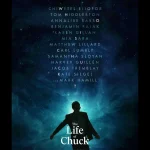Wealthy businessman Zsa-zsa Korda appoints his only daughter, a nun, as sole heir to his estate. As Korda embarks on a new enterprise, they soon become the target of scheming tycoons, foreign terrorists and determined assassins.
Chuck says:
When the films of Wes Anderson are discussed, his distinct, meticulously rendered, symmetrical stylings are often front of mind. As such, the thematic thread that runs through his work is often overlooked. Invariably, the focal point of his stories concern a character intent on reinventing himself, either in an effort to acclimate to their environment or atone for past behavior. Whether it be Royal Tenenbaum, the Fantastic Mr. Fox or Max Fischer and Herman Blume (“Rushmore”), existential angst is the catalyst that drives his narratives.
Such is the case with the filmmaker’s latest, “The Phoenician Scheme,” a witty, poignant look at one man’s efforts to right his many wrongs and reconnect with his estranged daughter. Zsa-zsa Korda (Benicio Del Toro) is the character in question, a ruthless industrialist whose practices are so self-serving, he’s endured six assassination attempts by his rivals. His coda, in both his personal and professional lives is, “If something gets in your way, flatten it!” This practice has left him with no family and suddenly, in dire financial straits. That he offers whomever he meets a hand grenade as a sign of friendship sums him up perfectly.
Yet, the latest attempt on his life, which opens the film, has opened his eyes. Suddenly, he takes an interest in his estranged daughter Leisl (Mia Threapleton), his nine sons and becomes focused on completing one last deal. It’s a vast infrastructure project that involves the building of a Trans-mountain Locomotive Tunnel, a Trans-desert Inland Waterway and a Trans-basin Hydroelectric Embankment, in the fictional titular country. And while the foundation of the deal has been established with a variety of partners, the specifics have favored Korda, something he fears that when found out, will put the project in jeopardy.
The bulk of the movie involves Korda, Leisl and the soft-spoken tutor Bjorn (Michael Cera) traveling hither and yon, meeting up with various investors in the deal to smooth over any rough edges that would stop it. This allows Anderson to utilize members of his stock cast, each called upon to exaggerate the eccentricities in the character they’ve been assigned. Visits to business partners (Mathieu Amalric, Jeffrey Wright), an aloof cousin (Scarlett Johansson) and bitter siblings (Tom Hanks, Bryan Cranston and Benedict Cumberbatch) are all on the itinerary. However, most curiously are the glimpses of heaven Korda experiences through various near-death experiences in which his eternal fate is the topic of discussion between a prophet (F. Murray Abraham), a knave (Willem Dafoe) and God himself (Bill Murray).
Anderson’s distinct visual stylings are, of course, in play. You’ve either become accustomed to or grown sick of it. Either way, it’s part-and-parcel of the director’s work, a trademark approach that unifies his films in a universe of his making, as is the stoic, ironic tone in which his stories are told. The off-hand way in which declarations of devotion or vital vows are delivered runs counter to his characters’ intent, this approach used to obscure the sincerity they’re afraid to express. The ironic humor this approach generates is perhaps Anderson’s most endearing trademark.
As expected, the cast is delightful, the addition of Cera to Anderson’s troupe is long overdue and welcome. Threapleton is a major surprise, the actress hitting the ground running, keeping pace with Del Toro throughout, her deadpan delivery and comic timing in step with the rest of the cast. She embodies the most important aspect of “Scheme,” that of forgiveness and reconciliation. Beneath her steely mien lies an aching heart, one we find is on its way to healing in the film’s final wonderful, touching moment.
3 Stars




